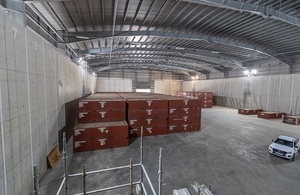Inquiry opened into Brighton Mosque
Press release
The Charity Commission has opened a statutory inquiry into Brighton Mosque & Muslim Community Centre (1122974) and appointed an Interim Manager.

The Commission opened the inquiry due to regulatory concerns resulting from a failure to resolve a dispute at the charity which is having a detrimental impact on the charity’s governance and administration.
On 28 September 2022, the inquiry exercised the Commission’s legal powers and appointed an Interim Manager to the charity to the exclusion of the parties in dispute. Mr Andrew Wilkinson of Shakespeare Martineau LLP takes charge of the management and operation of the charity and amongst other things will identify and appoint new trustees to the charity.
Earlier this year, the regulator issued the charity with an Official Warning after a former trustee was convicted of encouraging terrorism in a speech given on the charity’s premises. The Commission determined that the trustees knew or ought to have known the risk that this individual posed to the charity and set out the actions trustees should take to protect the charity and its beneficiaries from abuse. However, due to an ongoing dispute at the charity about control of its administration and management, there is an increased risk that appropriate actions will not be taken to protect the charity from further undue risk of harm.
The charity has also experienced financial management issues and submitted its statutory annual returns late for its past four financial periods. The Commission is concerned generally about the impact of the dispute on the charity’s ability to operate sustainably and for the benefit of its beneficiaries. The parties to the dispute have not, as advised repeatedly by the Commission, been able to appropriately settle the dispute in the best interests of the charity.
In order to investigate relevant matters further, and use its powers of protection and remedy, the regulator opened a statutory inquiry on 3 August 2022. The inquiry will examine the administration, governance and management of the charity and in particular:
- Whether the trustees have been properly appointed and/or removed at the charity since autumn 2021, in accordance with the governing document of the charity.
- Whether there is an accurate and clear understanding at the charity about establishing its members, including in terms of notifying and consulting with members about all relevant events at the charity.
- Whether the trustees have learnt from the issues which led to the charity receiving an Official Warning from the Commission in May 2022 and are willing, and able, to further the charity’s objects in an appropriate manner.
- Whether the charity’s income and expenditure has been properly accounted for, since autumn 2021, as part of appropriate financial management.
- Whether the charity’s expenditure has been used to carry out activities that exclusively furthered a charitable purpose.
The Commission may extend the scope of the inquiry if additional issues emerge.
ENDS
Notes to Editors
- The Charity Commission is the independent, non-ministerial government department that registers and regulates charities in England and Wales. Its purpose is to ensure charity can thrive and inspire trust so that people can improve lives and strengthen society.
- Section 76(3)(g) of the Charities Act 2011 gives the Commission power to appoint an interim manager to a charity to act as receiver and manager in respect of the property and affairs of the charity.
- Interim managers are appointed where the Commission has identified misconduct and/or mismanagement in the administration of a charity, or where it is necessary or desirable to protect a charity’s property. It is a protective measure.
Published 5 October 2022

